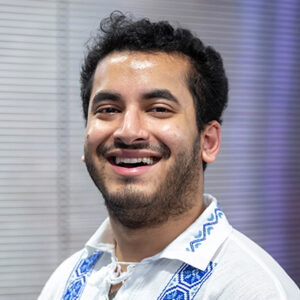
My greatest contribution to the field of medical education has been founding an online learning hub in partnership with Becoming a Dr (BAD), a volunteer-led organisation supporting aspiring and current medical students. We have created 75 online tutorials with a global reach of over 90,000, and students tuning in from 6 continents. In March of last year, we held a twitter event to connect medical students around the world. Students could tweet with #MedStudentCovid to advertise how they were helping with the pandemic response, and how others could get involved. We identified that the pandemic had disrupted regular teaching for medical students. While universities were moving to virtual learning, many students were running tutorials for their peers to supplement this. We decided to create a learning hub so students could deliver these tutorials live to their peers around the world.
Students who could not make the live tutorials due to other commitments or time zone differences, would be able to watch them in their own time. The sessions were uploaded to the learning hub, a website with all the lectures and slides organised based on target audience. The sessions were also made available on the BAD Facebook page, and Youtube channel. Our tutorials have covered 13 different medical and surgical specialties, including key non-clinical skills such as communication and reflective practice. Questions used in these sessions will be made available to students as part of BAD’s national question bank, a free open-access question bank for medical students in the UK.
Student feedback was core to our online sessions. When signing up to the mailing list, students were asked what makes a good online teaching session. We worked through these 30,000 responses to create a tutorial template for the tutors. This included guidance on tutorial length, visuals, how to make the session interactive, and more. I was given to opportunity to present the findings from these responses at the International Medical Education Conference 2021 (IMEC 2021).
Medical education has been a passion of mine for many years. I have worked with numerous organisations regarding medical student admissions and careers in healthcare. I was part of the organising committee for the Virtual Health Careers Conference 2020 (VHCC2020), an event for aspiring and current healthcare professionals. We provided workshops on applying to university, developing your portfolio, and specialty specific workshops. As I have a passion for paediatrics, I am a co-lead on a series aimed at getting medical students and doctors interested in paediatrics. We have been fortunate enough to publish work in partnership with the Royal College of Paediatrics and Children’s Health. As a mentor for the Imperial Outreach programme, I worked on widening participation in STEM careers. We journeyed with students from disadvantaged backgrounds, from the start of secondary school until their first year of university. Over the course of the programme we delivered regular laboratory sessions, homework clubs, summer schools, and university application workshops.
Over the years I’ve been so lucky to be able to work with so many remarkable medical students and clinicians who have been passionate about medical education. I’ve been able to learn from my mistakes and develop myself as a medical educator.
